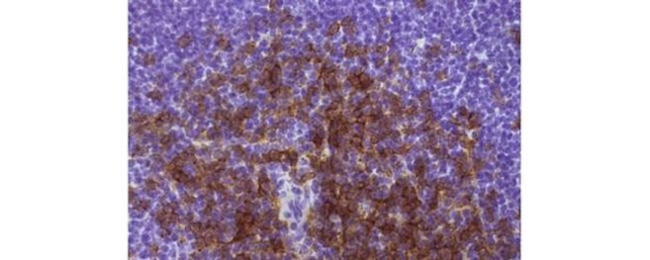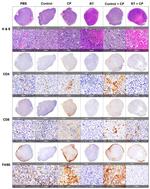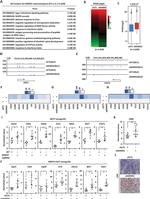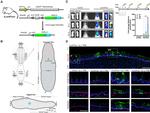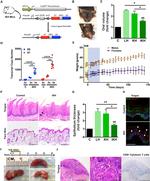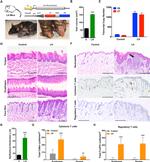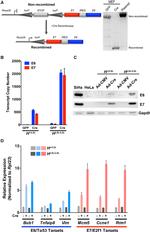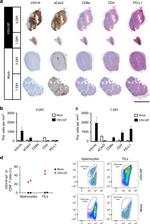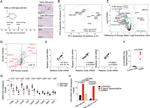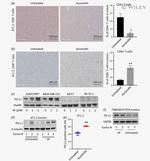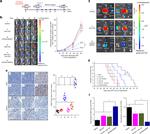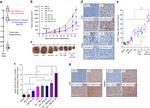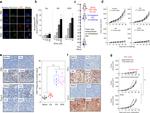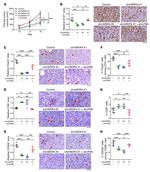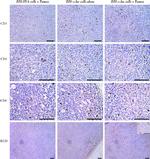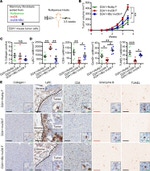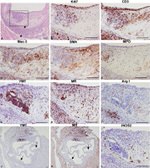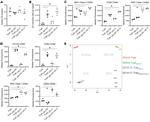Search Thermo Fisher Scientific
Invitrogen
CD8a Monoclonal Antibody (4SM15), Biotin, eBioscience™
Product Details
13-0808-82
Species Reactivity
Published species
Host/Isotype
Recommended Isotype Control
Class
Type
Clone
Conjugate
Form
Concentration
Purification
Storage buffer
Contains
Storage conditions
Shipping conditions
RRID
Product Specific Information
Description: The 4SM15 monoclonal antibody reacts with the mouse CD8a molecule. CD8a is an approximately 32-34 kDa cell surface receptor expressed either as a heterodimer with the CD8 beta chain (CD8 alpha beta) or as a homodimer (CD8 alpha alpha). A majority of thymocytes and a subpopulation of mature alpha beta TCR T cells express CD8 alpha beta while gamma delta TCR T cells, a subpopulation of intestinal intraepithelial lymphocytes (IELs) and dendritic cells express CD8 alpha alpha. CD8 binds to MHC class I and through its association with protein tyrosine kinase p56lck plays a role in T cell development and activation of mature T cells.
Recent studies have shown the 4SM15 antibody recognizes and binds a non-CD8a epitope in neural tissue. The 4SM15 clone is not recommended for staining of mouse neural tissue. For additional information please contact our technical service (tech@eBioscience.com). For detection of mouse CD8a in FFPE mouse neural tissue please refer to alternate product Anti-Mouse CD8a Purified (Product # 14-0195).
The 4SM15 monoclonal antibody is not recommended for immunohistochemistry of frozen mouse tissue. For detection of mouse CD8a using immunohistochemistry of frozen tissue please refer to alternate product Anti-Mouse CD8a Purified (Product # 14-0081-82).
Applications Reported: This 4SM15 antibody has been reported for use in flow cytometric analysis, microscopy, and immunohistochemical staining of formalin-fixed paraffin embedded tissue sections.
Applications Tested: This 4SM15 antibody has been tested by immunohistochemistry of formalin-fixed paraffin embedded mouse tissue using low or high pH antigen retrieval and can be used at less than or equal to 10 µg/mL. The 4SM15 antibody has been tested by flow cytometric analysis of mouse splenocytes and can be used at less than or equal to 0.25 µg per test. A test is defined as the amount (µg) of antibody that will stain a cell sample in a final volume of 100 µL. Cell number should be determined empirically but can range from 10^5 to 10^8 cells/test. It is recommended that the antibody be carefully titrated for optimal performance in the assay of interest.
Filtration: 0.2 µm post-manufacturing filtered.
Target Information
Cluster of differentiation 8 (CD8), a type I transmembrane glycoprotein of the immunoglobulin family of receptors, plays an integral role in signal transduction, and T cell differentiation and activation. CD8 is predominantly expressed on T cells as a disulfide-linked heterodimer of CD8alpha and CD8beta, where it functions as a co-receptor, along with T cell receptor (TCR), for major histocompatibilty complex class I (MHC-I) molecules; whereas its counterpart, CD4, acts as a co-receptor for MHC-II molecules. CD8 exists on the cell surface, where the CD8alpha chain is essential for binding to MHC-I. CD8 is also expressed on a subset of T cells, NK cells, monocytes and dendritic cells as disulfide-linked homodimers of CD8alpha. Ligation of MHC-I/peptide complexes presented by antigen-presenting cells (APCs), triggers the recruitment of lymphocyte-specific protein tyrosine kinase (Lck), which leads to lymphokine production, motility and cytotoxic T lymphocyte (CTL) activation. Once activated, CTLs play a crucial role in the clearance of pathogens and tumor cells. Differentiation of naive CD8+ T cells into CTLs is strongly enhanced by IL-2, IL-12 and TGF-beta1.
For Research Use Only. Not for use in diagnostic procedures. Not for resale without express authorization.
Bioinformatics
Protein Aliases: CD8a; CD8alpha; CD8b; CD8beta; fCD8; Leu-2; leu-2a; Lymphocyte antigen 3; Lyt-2.1 lymphocyte differentiation antigen (AA at 100); T-cell membrane glycoprotein Ly-3; T-cell surface glycoprotein CD8 alpha chain; T-cell surface glycoprotein CD8 beta chain; T-cell surface glycoprotein Lyt-2; T-cell surface glycoprotein Lyt-3
Gene Aliases: BB154331; Cd8a; Cd8b; Cd8b1; Ly-2; Ly-3; Ly-35; Ly-B; Ly-C; Lyt-2; Lyt-3; Lyt2; Lyt3
UniProt ID: (Mouse) P01731, (Mouse) P10300
Entrez Gene ID: (Mouse) 12525, (Mouse) 12526

Performance Guarantee
If an Invitrogen™ antibody doesn't perform as described on our website or datasheet,we'll replace the product at no cost to you, or provide you with a credit for a future purchase.*
Learn more
We're here to help
Get expert recommendations for common problems or connect directly with an on staff expert for technical assistance related to applications, equipment and general product use.
Contact tech support
